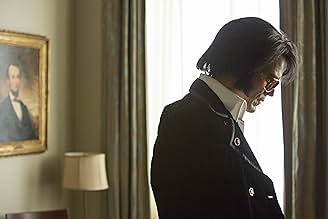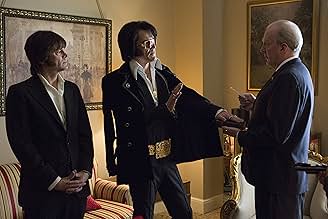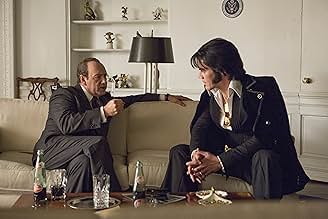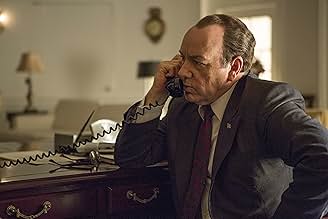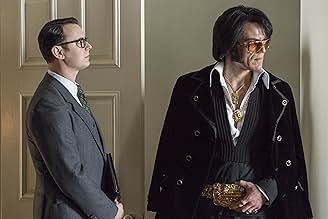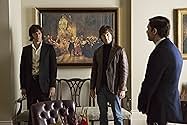Die unerzählte wahre Geschichte hinter dem Treffen zwischen Elvis Presley, dem King of Rock 'n Roll, und Präsident Richard Nixon, das zu dem aufschlussreichen, aber amüsanten Moment des Händ... Alles lesenDie unerzählte wahre Geschichte hinter dem Treffen zwischen Elvis Presley, dem King of Rock 'n Roll, und Präsident Richard Nixon, das zu dem aufschlussreichen, aber amüsanten Moment des Händeschüttelns führte, der in der am häufigsten angeforderten Photographie der National Archi... Alles lesenDie unerzählte wahre Geschichte hinter dem Treffen zwischen Elvis Presley, dem King of Rock 'n Roll, und Präsident Richard Nixon, das zu dem aufschlussreichen, aber amüsanten Moment des Händeschüttelns führte, der in der am häufigsten angeforderten Photographie der National Archives verewigt wurde.
- Regie
- Drehbuch
- Hauptbesetzung
- Auszeichnungen
- 2 Gewinne & 4 Nominierungen insgesamt
- Stewardess #3
- (as Skye Forsyth-Peters)
Zusammenfassung
Empfohlene Bewertungen
This historical documentation surveys an entirely separate side of Elvis from what the millennials may know about him. Did you know that he had a deputy's badge from Memphis? I sure didn't. It also turns out that he went to meet Nixon so that he could become a Federal Agent At Large in order to influence the American youth that tainted the country's image with the Hippie movement. Being America's most famous icon of the time, he decided to take advantage of his image by proposing possible anti-drug initiatives to the White House, including some drug-themed songs with other singers. The politicians all found it absurd to let someone like Elvis Presley meet the president of the United States, but since he's won the heart of all the voters in the south, the meeting gets the approval seal.
Revolutionary Road's Michael Shannon plays the King of Rock, and he talks as smooth, calm and collected as you'd think Elvis would be while not in front of a crowd. Unfortunately, he's not quite the right fit for the role, as he doesn't carry the project as well as he could. It's not that he's bad, he just doesn't put enough soul into the part.
It's otherwise intriguing to see what details are used to illustrate Mr. Presley. He still has all his little quirks that you expect from the King: he orders a maple bar from a donut shop, he calls the Beatles anti-American, and he says "thank you, thank you very much" right before sending people off with "sayonara." He watches three different television screens simultaneously and carries an assortment of diamond-studded pistols. There's more: he also had a twin brother who was born thirty-five minutes before him, only to die minutes later, and it makes him question how things would have gone if he was born first. It's stimulating and almost inspiring to see this unknown side to Elvis that actually cared about the American image and took the initiative for his beliefs.
However, this fascinating approach is supported by a rather clumsy first half. Elvis & Nixon was intended to generate laughter, but the laughs are far and few in-between, with dull scenes that either go nowhere or are composed of odd pauses between sentences. There are great additions such as fangirls working at the Bureau of Narcotics and Dangerous Drugs obsessing over Elvis's visit; the issue is that it's just too underplayed for what it had potential for. In fact, Elvis's interaction with Nixon should have started right from the get-go without an hour-long setup, because that is where the real funny begins. These moments express some beautifully uncomfortable humor between a celebrity and the president, made all the better by the naturally flowing chemistry between Michael Shannon and Kevin Spacey. I will admit, Spacey probably wasn't the right fit for the part: his mouth looks just like Nixon's but not his eyes. But that's more a bash on the casting director than the actor himself. Spacey still talks just as raspy as Mr. Nixon, and it's easy to tell that he took the character as seriously as if on House of Cards.
This is not the most spectacular piece of work you will ever see, you may not even remember it a week after seeing it, but it still gives a thought-provoking perspective on the influence that our celebrities have on our politics. Think of the artists of today. Consider how Taylor Swift's 1989 album influenced everyone's relationship expectations. Think back on the influence that John Lennon's Imagine shaped the hope everyone felt on the world. And don't get me started on all that Justin Bieber's went through. If you aren't dying to see Elvis & Nixon a second or even a first time, you can still bear in mind how our American icons influence far more than what we listen to in our spare time; the actions they take define what makes America the great nation we see it as.
Overall Grade: C+
What matters, however, is how interesting and appealing Spacey and Shannon make the film's central characters. Although we find a way into their respective worlds by way of Colin Hanks' "Bud Krogh" and Alex Pettyfer's "Jerry Schilling." Schilling in particular, whose fingerprints are evident throughout the movie ("me and a guy named Elvis" is a line of dialogue at one point," this being the title of Schilling's autobiography) and who acts almost like an audience surrogate.
Schilling, who we first encounter working at Paramount Studios, is encouraged back "in" with Elvis as we are taken on a journey to the White House that's foreshadowed in our first glimpse of the man, himself. Watching Dr. Strangelove on one of his three televisions in a nicely recreated Graceland television room. But this isn't just a reference to one of Elvis's favourite movies, the scene from Kubrick's film that's used here foreshadows the nature and tone of his meeting with Nixon. No fighting in the War Room? How about karate in the Oval Office?!
Along the way, Shannon, who doesn't resemble Elvis but embodies the role with gestures small and grand, speech patterns, glances and a physicality that's undoubtedly been studied, becomes believable as Elvis. This isn't a caricature. The caricature is what Elvis actually became. Which is appreciated in the way he expresses concerns about his identity to Schilling, and in a touching monologue about his stillborn brother, Jessie Garon.
Shannon finds genuine nuance and pathos in Elvis. Although Liza Johnson's direction doesn't quite allow the excitement and elation of meeting Nixon to be juxtaposed with crushing lows or an indication of how such ultimately manifested itself in Elvis over subsequent years. We see him disappointed when things aren't going his way and when meeting Nixon seems lost at one point, but standing slumped and resigned isn't enough to encourage deeper sympathy for Elvis. Whilst the ultimate irony was missed in failing to depict his own problems with drugs.
As Nixon, Spacey also finds nuance and manages to make the former President larger than life from behind a desk and despite his reservations about meeting Elvis, and just about everything else. He has less to work with than Shannon, but Spacey gets Nixon just right and manages to refrain from caricature whilst exploring amusing traits and mannerisms. Both physical and psychological.
Beyond the two central characters, the screenplay and some variable stock footage encourages political and cultural touch-points that aren't dwelled upon. Although it's clear that Nixon isn't adverse to finding good PR opportunities or impressing his daughters. A trend that crops up throughout the movie, with Elvis using such as a free pass at his convenience. For him, good PR opportunities are also valuable.
In many ways, however, Elvis and Nixon suffer the same issues with loneliness, isolation and concerns about their image. Which is something Elvis is portrayed as being more in touch with than Nixon, who laments about not looking like a Kennedy and tries to boost his ego by asking Krogh if he could take Elvis in a fight. Elvis, on the other hand, is aware of his image and the performance that's required just to be Elvis Presley. Which is something that was also expressed by Michelle Williams' Marilyn Monroe in Simon Curtis' 2011 film, My Week With Marilyn.
By the time Elvis and Nixon eventually meet, both characters have been fully established, and whilst the vignettes along the way are both funny and geared towards comedy, some miss the mark completely. Such as a clandestine meeting between Elvis and Nixon's aides, that hints towards All the Presidents Men but plays more like a parents' meeting. Although Elvis's visit to a doughnut shop that's populated by a streetwise and vocal black clientele shows him comfortable with all walks of life and able to keep his ego in check.
This is in stark contrast to his meeting with Nixon, where Elvis is far from humbled and tries to impress upon the President with bizarre notions and one-upmanship. In one shot, Elvis seems to dwarf Nixon in the way both men are framed. But Spacey plays the President with quick wit and more than a little bemusement at what's in front of him. He sees what see in Elvis. But can't see that he's playing him for his own gain.
Unfortunately, the pacing and editing falters during the final act, with Schilling's personal dilemma of getting home to his girlfriend breaking the meeting up at one point. Whilst Evan Peters and Johnny Knoxville's Dwight Chapin and Sonny West, respectively, linger in thankless roles.
What's also noticeable is a lack of Elvis's music in the film's soundtrack, which is quite good regardless. Although Ed Shearmur's score is transparent and obtrusive at times. But Elvis & Nixon isn't about Elvis and his music. It's about a quest to find something fulfilling in his life. Which is expressed with profound sincerity in the way Michael Shannon plays Elvis. Getting under his skin and contrasting charisma and personality with a pensive nature and moments of uncertainty. It's a warm, affectionate and earnest performance in a movie that's skewed towards comedy, but has an acute understating of not only Elvis and Nixon, but celebrity and politics.
Wusstest du schon
- WissenswertesBased on a true story. In December 1970, Elvis Presley met President Richard Nixon, who appointed Presley as an honorary DEA agent.
- PatzerIn the Oval Office: The Dr Pepper bottles logos are ten years ahead of their time.
- VerbindungenFeatured in Vecherniy Urgant: Olga Pogodina/Andrey Chernyshov (2016)
- SoundtracksHold On I'm Coming
Written by Isaac Hayes & David Porter (as Dave Porter)
Performed by Sam & Dave
Courtesy of Atlantic Recording Corp.
By Arrangement with Warner Music Group Film & TV Licensing
Top-Auswahl
- How long is Elvis & Nixon?Powered by Alexa
Details
- Erscheinungsdatum
- Herkunftsländer
- Offizielle Standorte
- Sprachen
- Auch bekannt als
- Elvis and Nixon
- Drehorte
- Produktionsfirmen
- Weitere beteiligte Unternehmen bei IMDbPro anzeigen
Box Office
- Bruttoertrag in den USA und Kanada
- 1.055.287 $
- Eröffnungswochenende in den USA und in Kanada
- 466.447 $
- 24. Apr. 2016
- Weltweiter Bruttoertrag
- 1.798.432 $
- Laufzeit1 Stunde 26 Minuten
- Farbe
- Seitenverhältnis
- 2.35 : 1
Zu dieser Seite beitragen








